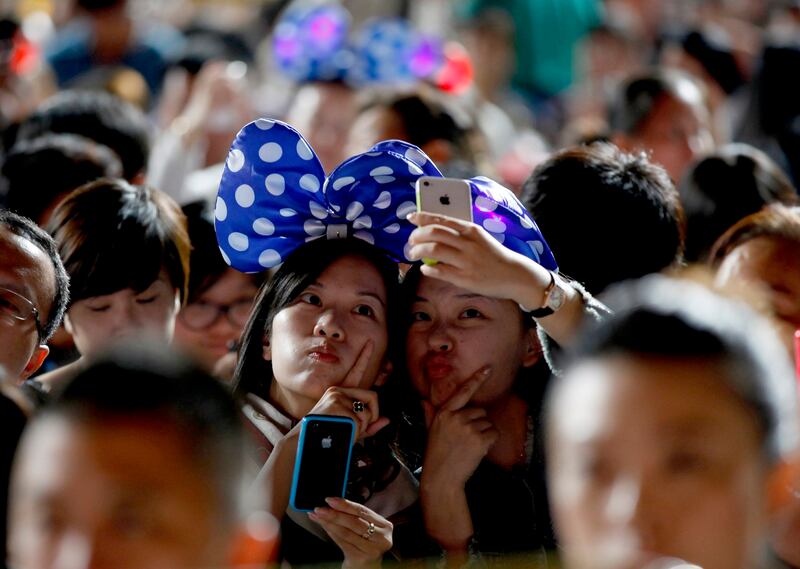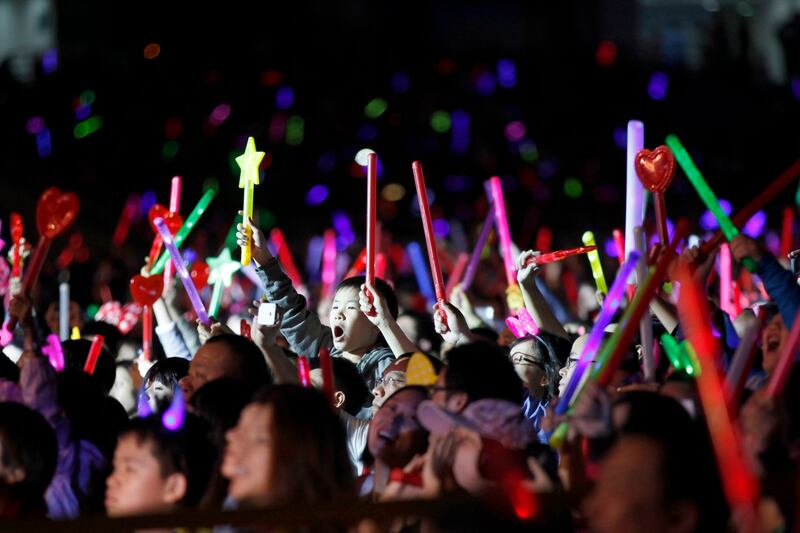China's media regulators are clamping down on some of the country's most popular satellite TV channels, warning them not to air too many star-studded entertainment shows, while calling for more content lauding the achievements of the ruling Chinese Communist Party (CCP) under Xi Jinping, state media reported on Friday.
Representatives of satellite broadcasters in Shanghai, Jiangsu, Zhejiang, and Hunan were called to a meeting with officials from the CCP's central propaganda department and the State Administration of Radio, Film and Television (SARFT), state news agency Xinhua reported.
"In recent years, radio and television stations in these four provinces and cities have ... made positive contributions in promoting mainstream values and spreading positive energy," the bosses were told.
"But some satellite channels also have problems, such as an excessive focus on entertainment, star-chasing and speculation, which must be resolutely rectified," the officials warned.
Instead, the channels should "vigorously promote the core values of socialism, focus more on hot topics in the new era [under CCP leader Xi Jinping], and focus on its fighters and workers," they said.
The channels were ordered to undergo "rectification and reform," and offer more high-quality shows that "guide and enrich the spiritual and cultural lives of the people," Xinhua said.
Shanghai, Jiangsu, Zhejiang, and Hunan Satellite TV are the most popular channels in China, churning out talent shows like "Voice of China" and massive hits like reality show "Call Me By Fire."
Instead, shows like Hunan TV's patriotic "China, I Love You" could become more the norm, once "rectification" is complete.
The warning to the satellite channels came as the SARFT unveiled a new production process for centrally approved radio, TV, and online audiovisual content "in the new era."
The agency called on all radio, TV, and online content producers to start making TV dramas, documentaries, and cartoons, as well as public service films, that "depict the major achievements and history of the CCP's century of struggle."
The newly commissioned content should "fully demonstrate that Xi Jinping's new era of socialism with Chinese characteristics has taken root," it said in a directive on Oct. 29.
The SARFT will also impose strict controls on the selection of actors and guests, as well as on performance styles, costumes, and make-up, it said.
Some social media users based said the four satellite channels targeted for "rectification" were the only channels they ever watched.
Some online comments took issue with the ongoing ideological crackdown on China's media, which was already tightly controlled.
"Isn't the point of TV that it's just for entertainment?" one comment said.
Others worried that the move would take China's radio and TV industries back to the pre-reform era.

Revolutionary operas
During the Cultural Revolution (1966-1976), Jiang Qing, wife of late supreme leader Mao Zedong, presided over the inception of "revolutionary model operas," the only form of entertainment available to China's population from 1966 until Mao's death and the fall of the Gang of Four in 1976.
They were available as theatrical performances, recordings, and movies, and their songs were picked up and sung by ordinary people across China.
The CCP -- which marked the centenary of its founding on July 1, 2021 -- recently ordered compulsory screenings of several of the model operas in movie form, along with patriotic war movies and other propaganda works across China starting in April, to run throughout the rest of the year.
Movie theaters are required to show the films several times a week, while CCP organizations and government departments are required to "mobilize" people to attend.
A political essay by a little-known commentator was given pride of place by China's state-run media over the summer, suggesting that Xi Jinping is taking the country away from the pro-market policies of the past four decades, which have become associated with decadence by party ideologues.
The essay, titled "Everyone can tell that profound social change is under way" and printed in CCP mouthpiece the People's Daily, uses the recent crackdown on China's scandal-hit entertainment industry to argue that profound political change is afoot that will focus on easing inequality.
The essay argues that the CCP has launched a "profound revolution" with its crackdown on celebrity culture, billionaires, and the private sector generally.
"This revolution will wash all of the dirt away," said the essay, signed by Li Guangman, columnist and former editor of the trade publication Central China Electric Power.
"Our capital markets will no longer be a paradise for capitalists to get rich overnight; our cultural sphere no longer a paradise for sex-crazed celebrities, and the worship of Western culture will no longer be a feature of our news coverage or public opinion," Li wrote.
The article was reprinted on Aug. 29 by state news agency Xinhua, CCTV, China News Service, the Global Times website, and Guangming.com.
"Literary and artistic workers, film and television workers must get down to the grassroots of society, making ordinary workers and ordinary people the masters and protagonists of art and literature," it said.
A culture and entertainment professional who gave only the surname Li said the entertainment industry has been hit by a number of scandals involving high-profile stars in recent months, including the accusation against pianist Li Yundi that he hired a sex worker.
"The way I see see it, these so-called stars, these so-called artists, are all just putting on a show," she said.
"This claim that stars will influence an entire generation is part of that," Li said. "Onstage, they're all chatty and bubbly, and offstage, they're involved in dirty transactions."

The Korean Wave
South Korean film and TV expert Huang Xiaoyi said much of China's current entertainment culture is heavily influenced by South Korea, and is known as the Korean Wave.
"South Korea has had a huge influence on Chinese variety shows, pop idols, music, and drama, even under the current restrictions on Korean content," Huang said. "So I think China is now trying to use the forms of these shows to do remakes."
He said the CCP under Xi has begun to insist on a closed domestic economy that meets its own demands with less consumption of foreign products, including media.
He said the move would likely result in an exodus of Chinese stars.
"I don't think all these entertainers will want to act in the same kind of show all the time, in these patriotic dramas about model workers, or political dramas," Huang said.
"To be frank, China will pay the price for this, because Chinese celebrities will leave the country," he said. "There will be huge restrictions [on domestic content], and this will also have a big impact on the export of Chinese programs and content overseas."
Translated and edited by Luisetta Mudie.
